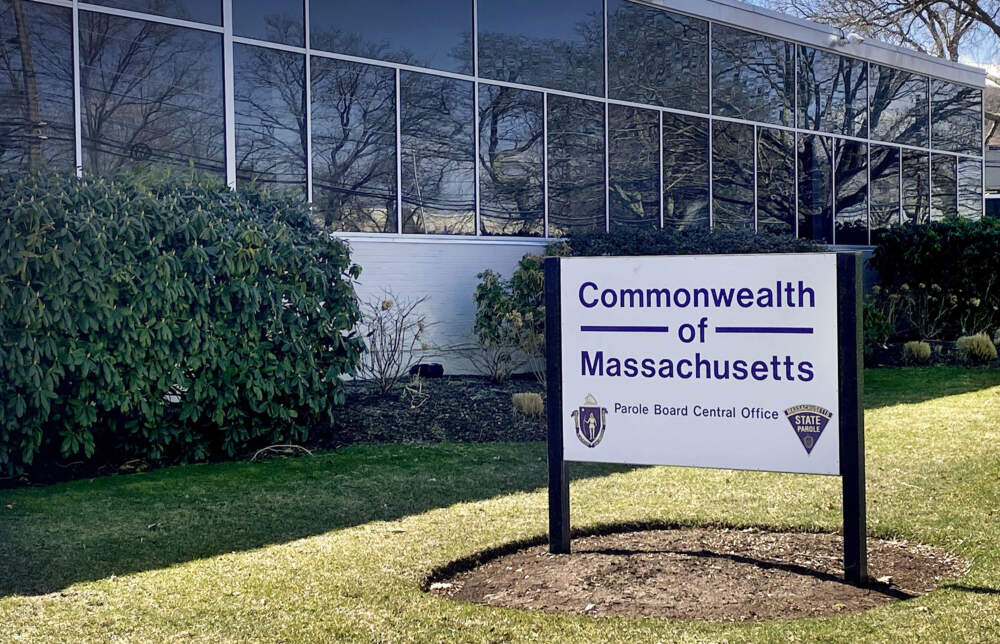Advertisement
More than half of arrests by Mass. parole officers were not parolees, latest data show
Massachusetts parole officers are charged with monitoring prisoners upon release, and bringing into custody those who don't abide by the conditions of their freedom. But the latest report from the state Parole Board disclosed a little-known side gig: More than half the time, these officers were helping arrest people who were not on parole.
The Parole Board's annual report, issued last fall, found some of its special state parole officers participated in the arrests of 358 offenders in 2022. Of those, 152 were parole violators. The other 206 were not.
The state agency that oversees the Parole Board promised this week the practice has ended after some state lawmakers criticized it, and WBUR requested comment Monday on the arrests.
The lawmakers asked why officers working for the state Parole Board were helping arrest people not on parole. Known as Parole Special State Police Officers, the officers are not fully trained as police or overseen by the board that certifies Massachusetts law enforcement officers.
"We're concerned if parole officers are participating with other law enforcement on drug busts or other investigations that are not at all related to checking in on a parolee, what is the oversight of those officers?" said state Sen. Jamie Eldridge, a Democrat representing Middlesex and Worcester counties, and co-chair of the Massachusetts Legislature's criminal justice reform caucus.
The caucus asked the Parole Board and the state Executive Office of Public Safety and Security, which oversees the board, to clarify the role of the officers. Eldridge said the board did not respond to the caucus letter. Additionally, another group of state lawmakers asked the Parole Board for data about the officers' responsibilities.
"This is the exact opposite of what parole officers should be doing," said state Rep. Russell Holmes, a Boston Democrat who is one of the lawmakers who brought concerns to the board.
"Parole officers should be trying to help people reintegrate into society, not acting like cops," he added. "If they want to be cops, they should take the test to become law enforcement officers."
According to the Parole Board's report, the officers arrested non-parolees "through their inter-agency task forces and partnerships." Past reports suggest the officers have been arresting people not on parole since at least 2015.
After WBUR's inquiry about the Parole Board's Special State Police Officers, the Executive Office of Public Safety and Security said the officers no longer have the authority to arrest non-parolees.
In an email, a spokesperson said these officers have worked with state police and one unspecified municipality — and made non-parole arrests — in the past, but "current practice" prohibits them from participating in inter-agency police activities "unless the investigation or warrant directly involves or relates to a parolee within the jurisdiction of the Parole Board."
According to the spokesperson, Executive Office of Public Safety and Security officials do not know when the Parole Board stopped allowing non-parolee arrests, and possess no data about the special parole officers' arrests in 2023.

A state law allows the Parole Board to appoint its own officers and allows them to perform police duties when accompanied by an on-duty police officer and when arresting parolees.
The arrests outlined in the annual report were made by special parole officers working in what's known as the Warrant and Apprehension Unit. The primary responsibilities of the 10-person unit are described as helping regional parole offices locate and arrest parole violators, and return them to custody. The officers monitor warrants for people on parole and also provide security for prisoners being transported to parole hearings. Officers in the unit primarily work with state police.
According to the state Executive Office of Public Safety and Security, there are a total of 110 Parole Special State Police Officers, most of whom work out of field offices.
The agency said these officers may perform police functions if they are on official duty as a parole officer and in the company of an on-duty local cop or state police trooper. The special parole officers are armed and required to attend 40 hours of training each year.
Unlike other law enforcement officers, Parole Special State Police Officers do not fall under the jurisdiction of the Peace Officers Standards and Training (POST) Commission. The panel, created as part of criminal justice reform legislation passed in 2020, oversees the training, discipline and certification of law enforcement officers in Massachusetts. A commission spokesperson said the law "did not stipulate officers for the Parole Board as falling within the scope of the POST Commission."
When questioned about the officers during a legislative hearing this week, Massachusetts Parole Board Chair Tina Hurley said an agreement has been drafted to stop allowing the officers to arrest non-parolees.
“I can tell you that no longer is happening,” Hurley told the lawmakers.
Holmes, who questioned Hurley during the hearing, asked the Parole Board for current data about non-parolee arrests and said his group will meet again to review that information.
“I have not seen data saying there have been zero arrests by these officers,” Holmes said. “I want to see any agreement to prohibit this in writing. How can I trust an organization that allowed this to happen to begin with?”
Holmes said he is also seeking other reforms from the Parole Board such as narrowing a near-universal mandate for parolees to undergo drug and alcohol testing. He also wants the board to reconsider requirements that prisoners take certain classes before they're paroled even if the classes are not offered at the correctional institution where the prisoner is held.
"It's a cultural problem within parole that has to change," Holmes said.
